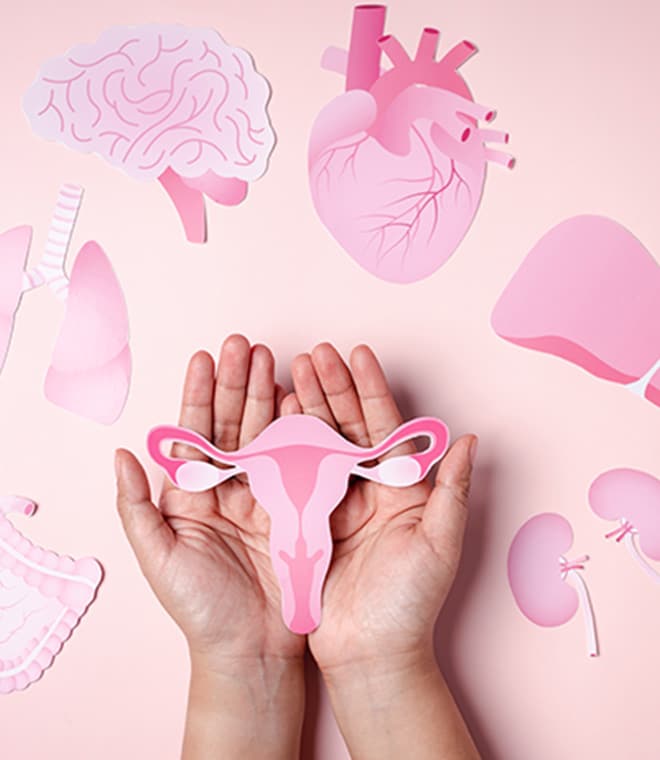Health
Can you get menopause headaches?
By Patricia Ann Convery, MD, Fellow, American College of Obstetrics and Gynecology Mar 28, 2025 • 5 min
Headaches are one of the most common conditions, and most people will experience a headache at some point in their lives. Women who experience headaches in their 40s and 50s may wonder if they’re connected to perimenopause, a stage of life leading up to menopause in women when hormones tend to fluctuate.
Are headaches a symptom of menopause?
Headaches can be a symptom of menopause in some cases. Hot flashes, night sweats and irritability may be more well-known vasomotor symptoms, but headaches in perimenopause are also common. The female sex hormone estrogen and brain chemicals that contribute to headaches are closely linked. As a result, headaches often coincide with the menstrual cycle. When estrogen levels decrease right before your period, you may experience a headache.
During perimenopause, different hormone levels fluctuate, particularly estrogen, which may cause symptoms. When these levels change, headaches may also occur. Also, hormone replacement therapy (HRT) can sometimes cause headaches as a side effect.
If you experienced headaches before menopause, your symptoms may worsen, or they may improve during perimenopause.
What types of headaches are common in menopause?
Scientists and medical experts have identified many different types of headaches based on their clinical features. Two types are especially common during perimenopause: tension headaches and migraines.
- Tension headaches: Often perceived as an aching or tight band feeling on both sides of the head, tension headaches can cause mild to moderate levels of pain. Although the exact causes aren’t understood, they seem to be connected to stress and are often associated with muscle tightness in the neck and back of the head.
Tension headaches during perimenopause may be due to negative thoughts and feelings about going through this life stage. They may also occur due to stress caused by other symptoms of menopause or additional factors. Sleep problems, like insomnia, may also contribute to tension headaches. Many people have problems getting a good night’s sleep during perimenopause. - Migraine: Pounding or throbbing headaches that are moderate to severe and often accompanied by other symptoms may be a migraine attack. Sensitivity to light, nausea and/or vomiting, dizziness, blurred vision, loss of appetite and other symptoms are often experienced with migraine attacks. Women who previously experienced migraine episodes may have more frequent or severe headaches during menopause. On the other hand, some migraine sufferers report that their headache frequency or severity decreased in the months and years before menopause.
Research has established a potential link between migraine headaches and hot flashes. One study found that women who had a history of migraines were more likely to have severe hot flashes than those who didn’t. The findings indicate that migraine headaches and hot flashes may have similar causes. Specifically, researchers hypothesize that both may be triggered by changes in blood vessels that occur during perimenopause. Studies have also suggested that women who experience migraines and vasomotor symptoms such as hot flashes during perimenopause may be more at risk for stroke and cardiovascular disease.
What are the treatments for perimenopause headaches?
Healthcare providers typically treat headaches from perimenopause the same way they do at other times in life. For the milder headache, over-the-counter pain medications are often the first line of treatment. If they fail to alleviate symptoms, doctors may prescribe other medications. Stress management and exercise may also be recommended.
When healthcare providers believe headaches during perimenopause may be due to hormone replacement therapy, they will weigh the benefits of treatment against how the side effects impact a patient’s daily life. In some cases, switching the form of the medication (example: from an oral medication to topical patch), strength, or main ingredient may help reduce headaches.
If frequent headaches during perimenopause get in the way of your daily activities or make it hard for you to rest at night, talk to your healthcare provider. They can prescribe treatments and recommend lifestyle changes that may reduce discomfort and lower the likelihood of headaches occurring in the future.
Updated by Julie McDaniel, MSN, RN, CRNI, March 2025.
Sources:
- https://medlineplus.gov/ency/article/000797.htm
- https://www.migrainedisorders.org/hormones-menstrual-migraine-treatments/
- https://www.uptodate.com/contents/estrogen-associated-migraine-headache-including-menstrual-migraine
- https://www.neurology.org/doi/10.1212/WNL.0000000000012741
- https://www.ncbi.nlm.nih.gov/books/NBK554510/
- https://www.ninds.nih.gov/health-information/disorders/headache
- https://pubmed.ncbi.nlm.nih.gov/38350045/
- https://womenshealth.gov/menopause/menopause-symptoms-and-relief




